Retired in Rome Journal: May Day celebration in Abruzzo a slice of rural life in a country of turmoil
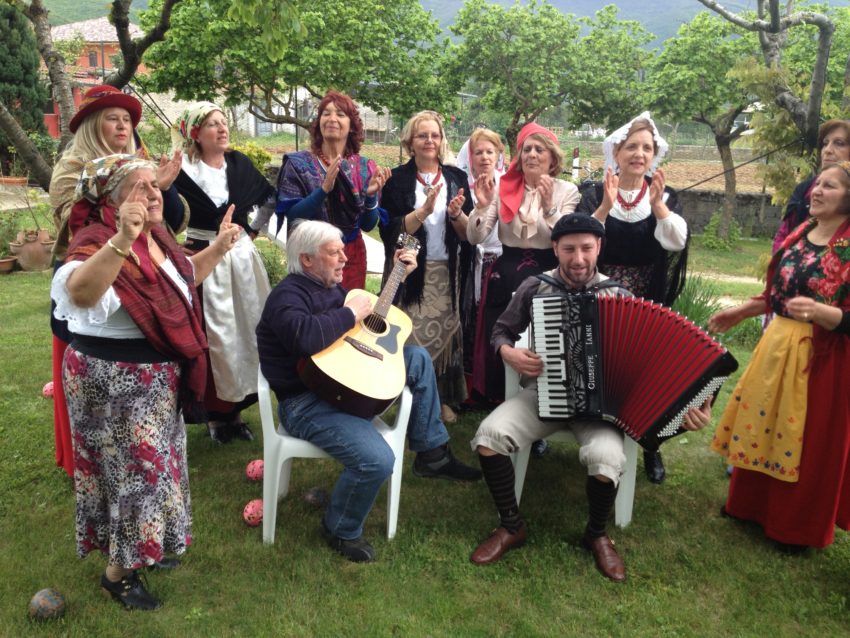
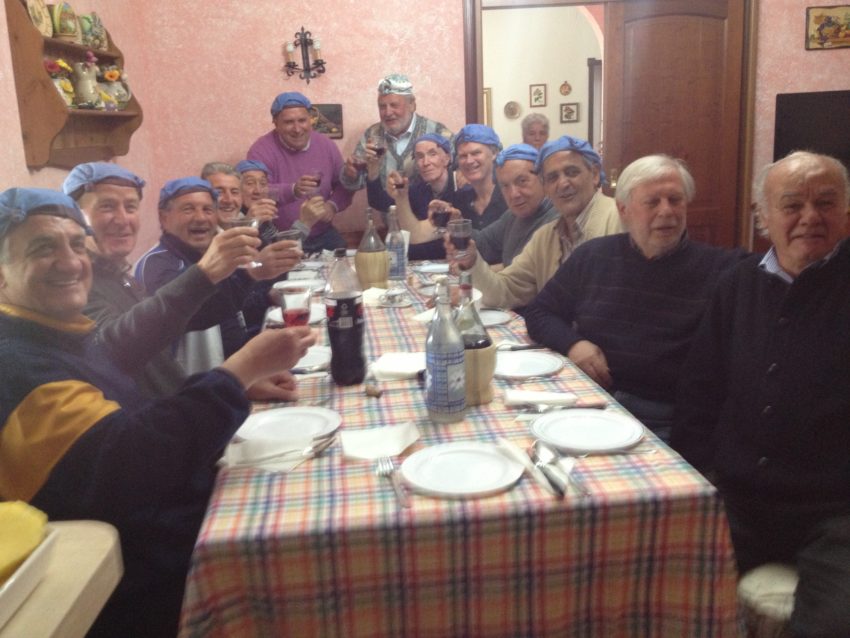
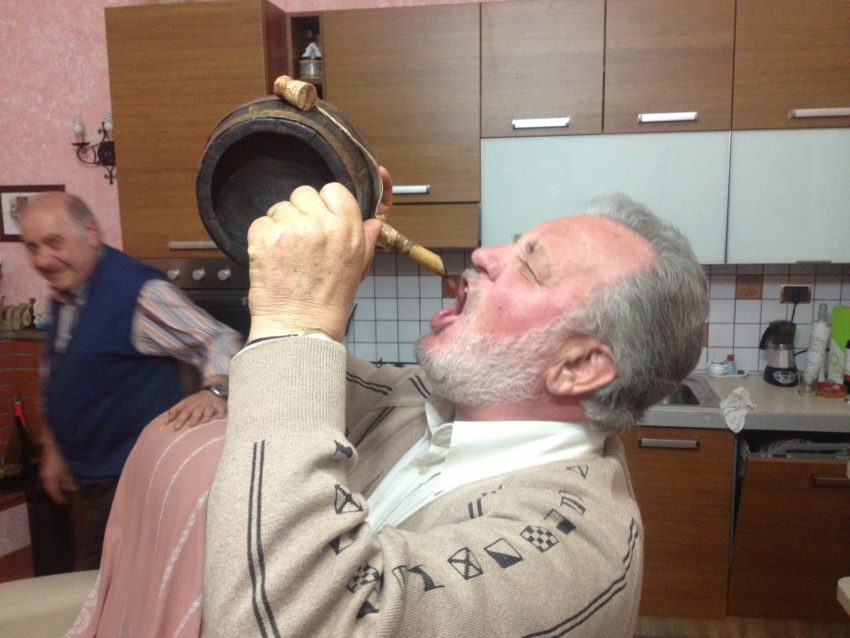
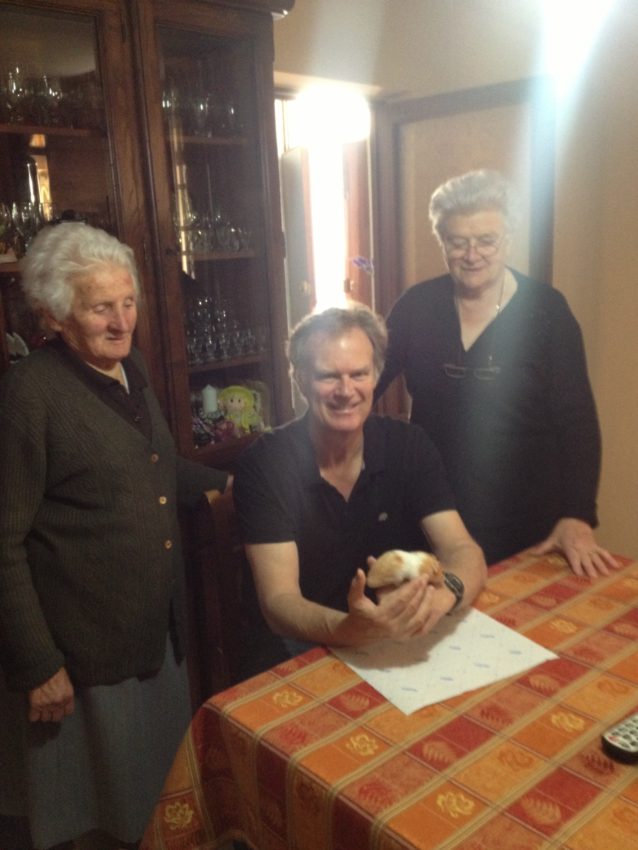
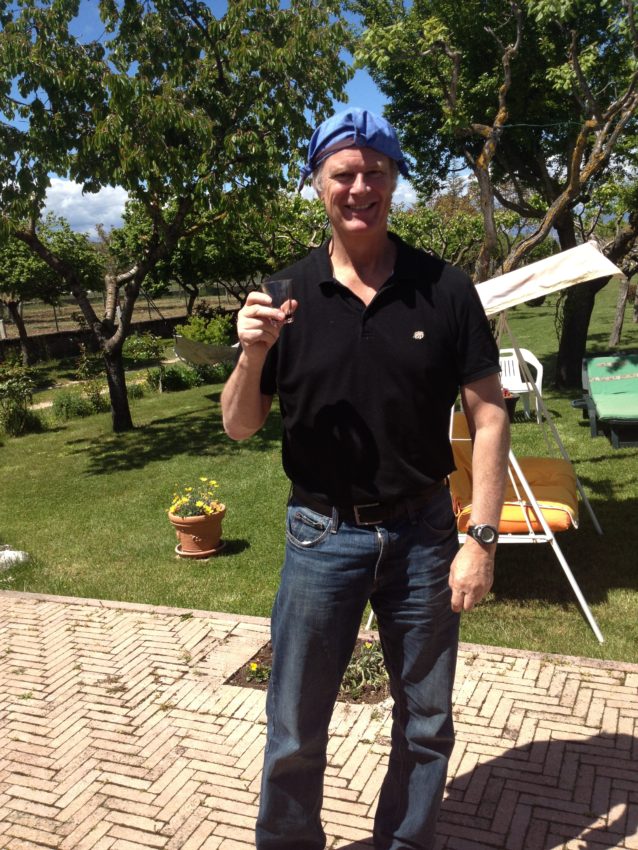
MAY 2
TRASACCO, Italy — I grew up associating May Day with communism. I remember reading newspaper stories about Workers Day parades through Red Square. I had images of propaganda posters showing a hot Russian babe with broad shoulders and a tight blouse standing in a sun-splashed wheat field holding a scythe in one hand and forming a fist with the other. The only time I ever saw any news snippet from Albania was on May 2, the day after the most communist country in history released a photo of armed soldiers marching through the streets of the capital, Tirane. Those photos began my life-long obsession with Albania which eventually resulted in a cover story in the Los Angeles Times’ travel section a year after the government fell and an Albanian live-in girlfriend for a year.
If only I’d seen how Italy celebrated instead.
It’s healthy to have a life-long obsession with great food, homemade wine, grappa, more food, bocce ball under snowcapped mountains and traditional music, dancing and costumes in a celebration that will never find its way into guidebooks. The only problem is if I eat one more piece of sausage I’m going to oink. I am also armed with enough dirty Italian phrases to become any Italian woman’s new Date From Hell.
I have returned from two days in Abruzzo, the widely overlooked region east of Rome’s Lazio. Abruzzo is where rural Italian life mirrors my life-long image of Italy: good friends drinking Chianti from wide, wicker-bottomed bottles under grapevines, of accordion music playing old Italian love songs. The town of Trasacco has about 6.000 people and is nestled in the foothills of the Apennine Mountains which form the spine of Italy stretching from Sicily to Genoa. Abruzzo has three spectacular national parks spiderwebbed with hiking trails, meadows covered in multi-hued wildflowers and charming towns void of tourists or even postcards.
Greeting me were Lucia Mosca and Lorenzo Del Vecchio, Abruzzo natives who have lived in Rome for years but return to this large villa every chance they get. Lucia is a handsome blonde with fashionable glasses and a warm smile. Lorenzo is a bear of a man with a head full of shocking silver hair and silver goatee. Like most Italians who must end seemingly every word with a vowel, he persisted in calling me, “JOHN-ne.” I didn’t mind. The hospitality they showed would make every overworked American quit their job and take Italian lessons.
The villa is a large single-level dwelling packed with images of horses, old Abruzzo drawings and antique figurines. You could hold a soccer practice on their sizable lawn where an archery target stood off to the side. A comfy deck screams evening limoncello and antipasti plates of sausages, cheeses and olives.
They were making a traditional “Primo Maggio” (May First) feast for about 30 people. I walked into a work room where one of Lorenzo’s male friends sat next to a giant pile of ground sausage. He would take a few fingers worth and slowly roll it into tiny balls and place it on a tray. After spending hours filling up a few trays — then no doubt getting treated for Carpal Tunnel — he’d dump it into a giant steel bucket where they’d make the traditional Primo Maggio minestrone.
This tradition of Workers Day in Italy goes back to the late 1800s when farmers took the day off to eat and drink. It went away for 20 years but ever since it returned in 1945, May 1 has been the designated day to do what Italians do as well as anyone on earth.
Eat.
This is how many Italians counteract frustration mounted over things they have little control over such as low salaries, a sloth-like postal service and a bus system that seems to schedule based on throwing darts at a wall. Few Western European countries should take Worker’s Day as seriously as Italy. Unemployment here is 13 percent, the highest since the Italian statistical body, Istat, started keeping stats in 1977. Unemployment for those under 25 is an astounding 42 percent. You think an American college diploma is no longer worth the paper it’s printed on? I’m seeing young Italians perforating their diplomas and putting them on a roll.
But this isn’t all about May 1. April 30 has as big a feast tradition in Italy as Christmas Eve does in the U.S. About a dozen friends, mostly Abruzzesi who have since moved to Rome, gathered here at a long table with beautiful blue print dishware. I was about to experience my first Italian BBQ. First came a traditional egg sandwich, kind of like a cold omelet that has been served in Abruzzo for centuries. Then came big piles of fat, juicy, lean sausages fresh off Lorenzo’s grill. You didn’t dare deface them with hotdog buns and mustard. Besides, Southern Italians eat more fresh reindeer meat than condiments. Then came two or three different white cheeses, roasted asparagus and big bowls of fresh, ripe, slobberingly sweet strawberries.
Lorenzo wasn’t done. He picked up a miniature barrel about the size of an American football. A bamboo spigot stuck out like a musical instrument’s mouthpiece. Inside this copella was what he called cerasuolo, a traditional wine blend of 65 percent white Trebbiano and 35 percent red Montepulciano d’Abruzzo. He then asked me to carry on another Abruzzo tradition.
“Vuole bacia Maria?” (Would you like to kiss Mary?) I was to hold the bucket, aka Mary, upside down away from my face and let the wine pour through the air and into my mouth, not swallowing until I can’t hold any more. I remember doing this in my college fraternity but never thought I’d do it in rural Italy. However, when in Abruzzo …
I woke the next morning to a sky as blue, clear and pure as a robin’s egg. At 2,200 feet, Trasacco had a nice cool breeze coming in off the Apennini. It was 52 degrees, perfect conditions to cruise around a small Italian town on holiday. Nothing was open but a couple of neighborhood cafes and a tobacco shop. Old men sat in the small main piazza. Women leaned out over their flower beds on their balconies. The only sounds were birds chirping and shoes padding along cobblestones in the narrow, windy streets. A friend also up from Rome, Giovanna, and I stopped an elderly woman and asked for directions. Next thing we knew Zeferina invited us into her tiny living room for coffee and biscuits. Her sister, Natalina, who like Zeferina has lived in Trasacco her whole life, joined us. A picture of Zeferina’s son wearing ‘80s style tight, short gym shorts directing traffic in a volleyball match hung on a wall. He died of a brain tumor 25 years ago. Her pet hamster, Ciccio, crawled around my hands as we talked about life in rural Abruzzo.
Trasacco, one of the first towns in Abruzzo to practice Catholicism, was wiped out by an earthquake in 1915. A lone tower built by the Romans survived but today it’s only half its original size. The 2009 earthquake that killed 297 people in L’Aquila and nearly destroyed the Abruzzo capital 40 miles away, even rattled Zeferina’s home. But while 65,000 people were left homeless in L’Aquila, the only damage to her house was a clock that was stuck at 3:30 p.m., the exact time the earthquake hit. This is a volatile area, built right on a fault line. However, the quiet streets and lazy pace of a small town nestled in the Italian foothills have plenty of appeal. Most of the homes around Zeferina are second homes owned, like Lucia and Lorenzo, by people living in Rome.
When we returned to the villa, Primo Maggio was in full swing. Three dozen people split into two dining rooms, the men in one room and the women in the other. My feelings of being at my first YMCA dance ended when I started talking to Roberto next to me. Roberto is a stocky, balding man in his 50s who expressed a desire to make me think he is the most pussy whipped man in Italy. After five minutes of small talk, he gave me an Abruzzese proverb: “Povera casa dove la mattina la gallina canta ed il gallo tace.” The loose translation is “The house is where in the morning the woman kicks the man into silence.”
For Lesson No. 2 they told me another traditional phrase, only used in settings like this: “Scopara ‘alla pecorina.” (Fuck like a sheep.) I’m really hoping none of the men explained later to their wives why our room was laughing so much more than theirs.
After a feast of minestrone soup, breads, meats, sausages and cheeses, then a loooong series of bocce ball games (combination of bowling and curling and played in Italy since the Roman Empire), the real partying started. The women came out in a conga line of traditional clothes made of what looked like curtains from a 1960s Bay Area drug den. These brightly colored, flowered patterns, shawls and head scarves were worn here 100 years ago and as they all sang traditional Abruzzese songs to an accordion player in a top hat, I felt transported back to the early 20th century. The women and men sang songs, danced in circles and basically stepped back to a romantic time many frustrated Italians wish they were in today. With the whirling head scarves and flirtatious songs, I felt like I was watching one of those cultural events American Express buses disgorge tourists to watch. But then I realized: I was the only outsider. They were doing this for themselves. Not me.
This was the real thing. This was the real Italy. This was what I moved to Italy to experience. And as the sun set behind the snow-capped peaks in front of us, we all raised glasses of grappa and toasted life in Abruzzo. And I toasted a people who can rise above turmoil to taste the honey of la dolce vita.

